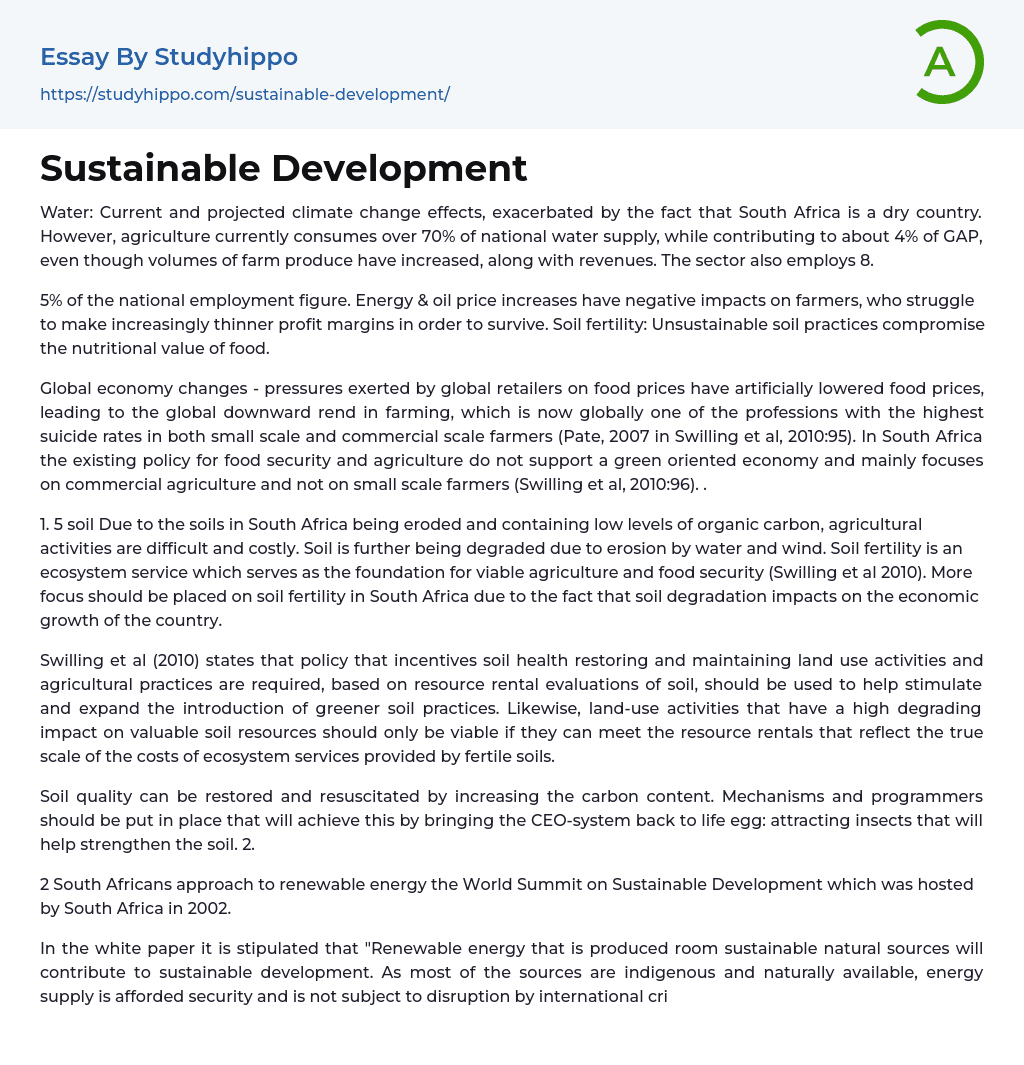Climate change has caused a water shortage in South Africa, which presents a significant challenge due to its naturally arid environment. However, over 70% of the national water supply is consumed by agriculture, which only contributes 4% to GDP and leaves farmers with low profit margins. Unsustainable soil practices further compromise food quality through erosion from wind and water. The global economy puts additional pressure on farmers as retailers drive down food prices resulting in high rates of suicide among them. Current agricultural policies prioritize commercial farming at the expense of small-scale operations limiting their potential for promoting eco-friendly practices. Swilling et al (2010:96) have noted that low levels of organic carbon combined with erosion contribute significantly to soil degradation in South Africa making agriculture challenging and costly. Soil fertility underpins viable agriculture and food security
...according to Swilling et al.(2010), so it should be prioritized in South Africa as it has implications for economic growth in the country. To promote eco-friendly soil practices and maintain productive land use, policies should assess the rental value of soil resources incentivizing restoration and upkeep of soil health.It is necessary for land-use activities that have a significant impact on valuable soil resources to pay resource rentals that reflect the real costs of ecosystem services provided by fertile soils in order to ensure financial viability. In order to improve South Africa's soil quality, measures need to be taken which aim at increasing carbon content and restoring the CEO-system. The World Summit on Sustainable Development in 2002 emphasized renewable energy strategies that focused on producing sustainable natural sources for South Africa's sustainable development. Renewable energy from indigenous and naturally available
sources ensures secure energy supplies unaffected by international crises or limited supplies while reducing emissions and generating additional financial resources for sustainable development. However, implementing renewable energy policies in South Africa is complex due to conflicting investment and regulatory signals sent out by disjointed efforts among stakeholders despite interest from international entities and lobbying bodies as pointed out by Koura (2011:3). The complexity faced by the South African energy sector is due to uncertainty and power dynamics among its actors. Additionally, poverty issues hinder business development posing a challenge for sustainable development experts and the nation's stability, according to Koura (2011:5). Due to little pressure from the impoverished majority, Eskom lacks incentive to prioritize renewable energy policies.Renewable energy developers face hindrances due to limited access to financial markets and unequal credit opportunities caused by South Africa's classification as an emerging market and third-world nation. This favors existing energy providers who use traditional methods of generation, transmission, and distribution, leading to stagnation in progress. Corruption, graft, and lack of transparency further impede systemic change. However, the white paper suggests creating a conducive environment with fiscal support mechanisms under appropriate legal and regulatory frameworks for renewable technologies to compete with fossil-based ones. Government support is required to establish initial market share, demonstrate viability of renewable sources, promote economies of scale and technological advancements.
South Africa's Electricity Sector relies solely on Eskom for electricity generation/transmission; hence six new regional structures were formed for electricity. To aid implementation of renewable energy solutions, Central Energy Fund (CEF) should expand its operational assistance while measures must be taken to stimulate the market by prioritizing available technologies with high local content that reduce
costs and create job opportunities. Technology-support centers should also be established in existing research institutions to aid ongoing development and system certification.The South African government's responses should be analyzed for their appropriateness and adequacy. Their monitoring, evaluation, and reporting systems require improvement to measure sustainable development targets across all sectors. However, there are gaps in the current monitoring tools such as a lack of a sustainable development 'score card' for social partners and audited financial compliance instead of qualitative ecological sustainability. Collating reliable information at various levels is challenging but important for saving what remains of our planet and reversing damages caused by human development. It is crucial to take drastic measures to address threats and challenges to the CEO-system in order to ensure Earth's survival along with its inhabitants'. Raising global population awareness regarding the impact of human demands on the planet is essential. Society must address unequal resource distribution that not only adversely affects those less fortunate but also contributes to climate change and environmental degradation. Taking action against this inequality is necessary for our planet's continued thriving.
- Agriculture essays
- Albert einstein essays
- Animals essays
- Archaeology essays
- Bear essays
- Biology essays
- Birds essays
- Butterfly essays
- Cat essays
- Charles Darwin essays
- Chemistry essays
- Dinosaur essays
- Discovery essays
- Dolphin essays
- Elephant essays
- Eli Whitney essays
- Environmental Science essays
- Evolution essays
- Fish essays
- Genetics essays
- Horse essays
- Human Evolution essays
- Isaac Newton essays
- Journal essays
- Linguistics essays
- Lion essays
- Logic essays
- Mars essays
- Methodology essays
- Mineralogy essays
- Monkey essays
- Moon essays
- Mythology essays
- Noam Chomsky essays
- Physics essays
- Plate Tectonics essays
- Progress essays
- Reaction Rate essays
- Roman Numerals essays
- Scientific essays
- Scientific Method essays
- Scientist essays
- Seismology essays
- Space Exploration essays
- Stars essays
- Sun essays
- Thomas Edison essays
- Tiger essays
- Time Travel essays
- Universe essays




